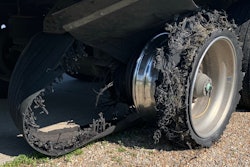The long Memorial Day weekend annually plays host to a looming and persistent threat: cargo theft.
Looking at theft data from 2019 to 2023 for the Thursday prior to Memorial Day to the Wednesday after, CargoNet estimated that total losses were valued at $12.4 million, with an average loss valued at $264,016.
“Your response time is critical,” said Scott Cornell, transportation lead and crime and theft specialist at Travelers Insurance. “The longer it takes for you to respond to a cargo theft, the less chance you’re going to have of recovering it.”
After the first 24-48 hours, Cornell said that your chances of recovering a stolen load of cargo drops by at least 40%.
[Related: Surge of cargo theft is 'hitting us like lightning,' experts say]
Knowing the basics
One of the most impactful ways to prevent cargo theft is through education and preventive measures. Cornell advised fleets to set a foundation of good processes and procedures, starting with teaching frontline employees the latest methods and trends for cargo theft. For example, if they’re hauling electronics in Southern California, they should be taught how electronics are being stolen and areas where it’s most likely to happen.
Cornell also pointed out the importance of implementing red zone rules by instructing drivers to park in secure and well-lit areas, and using hard-locking devices, air cuff locks and landing gear locks to protect the load from being stolen and moved. Techniques such as geofencing and route-fencing are useful tools to leverage covert tracking, either inside the cargo or trailer.

“The real issue is someone impersonating the carrier or stealing their identity, then going to a warehouse, picking up freight, and disappearing. That’s the majority of what’s going on,” said Frank Matarazzo, CEO of Fusion Transport.
With the rise of fictitious pickups and identity theft tactics, an important step is verifying the legitimacy of cargo carriers.
Matarazzo suggested having a carrier vetting process in place that identifies who the carrier is on paper. From knowing what type of authority they have to their safety record and their truck count – knowing these basic criteria of the carriers is essential.
Another part of this is having a step put in place and a checklist to go through on the ground at the warehouse or wherever the freight is being loaded. From looking at operating authority, to insurance, look at anything different from the original booking. “For us, we have a checklist of items that need to be verified before we even back a truck in to a door,” said Matarazzo.
Technology as a double-edged sword
Although technology plays a crucial role in reducing cargo theft, it can also create new opportunities for thieves to exploit.
According to an earnings call, J.B. Hunt Transport Services (CCJ Top 250, No. 3) saw strategic cargo theft increase in the first quarter of the year. “While technology is a foundational pillar for us, it has opened new avenues for bad actors to engage in sophisticated strategic theft given these organized groups’ access to thousands of loads through our platform,” said Brad Hicks, president of highway services and executive vice president of people at J.B. Hunt.
This has prompted the company to adjust and enhance security measures, with Hicks commenting how the company is shifting some processes to be more manual in nature until the new security features are implemented.
Matarazzo noted the rise of strategic theft is a reminder of getting down to the basics. “When the rubber meets the road, you need to verify who is showing up at your door. Is this the company you expected? When a bad actor claims to be ABC Company, it's rarely ABC Company that shows up. You need to check the driver's license, registration and insurance. Inspect the truck and trailer. This is not technology-based and should be done by every warehouse.”
At the same time, the benefits of leveraging technology in preventing cargo theft are substantial.
An effective method of reducing cargo theft with advances in tech is through enhanced freight visibility, said Joe Ohr, chief operating officer at NMFTA. “It's crucial to have visibility, not just of the truck, but also of the trailer and the assets inside. However, it's important to ensure that only authorized personnel have access to this visibility."
Legacy and new products can also add extra layers of security to various steps in the shipment process for carriers. C.J. Gallo, senior product manager at Transfix, talked about the company’s newest tool called RateCon Shield, which helps prevent carriers and brokers from double-brokering schemes.
Gallo explained that an intelligent QR code is placed on rate confirmation documents. “When carriers receive a shipment offer, they can scan the QR code to verify that the confirmation and load are legitimate, authentic and are coming from the expected broker, along with detailed information about the shipment.”
Ohr pointed out that it all goes back to training employees to be vigilant and aware. “Ensure you have technology that tracks not only your trucks but also your cargo. Conduct regular audits of your technology to confirm that only authorized personnel have visibility into your cargo. Additionally, train your back-office staff to be cyber-aware and avoid falling victim to look-alike domains."
[Related: Tools to spot unauthorized cargo movement, an integration to combat freight fraud and more]
Importance of discussing cargo theft
As an industry-wide issue, communication is essential when it comes to fraud mitigation, said Gallo. Carriers, brokers and shippers alike should take the time to evaluate what’s out there to help prevent cargo theft, double-brokering, cyber-attacks, among many other forms of freight fraud.
"Things can go awry at any given moment in a load’s journey,” Gallo said. “So, when something seems or feels ‘off,’ carriers should always share that as it happens. And they should have the access to their partners to be able to do that.”









